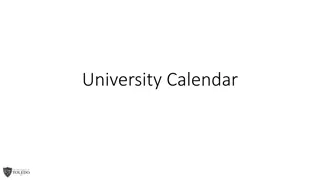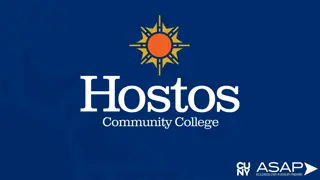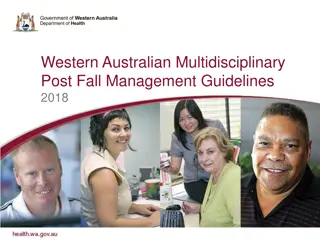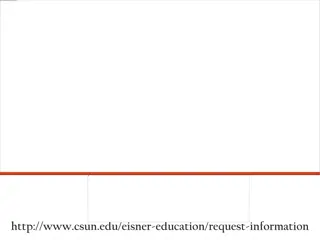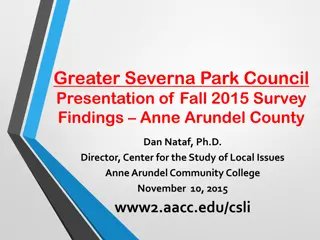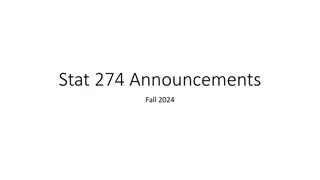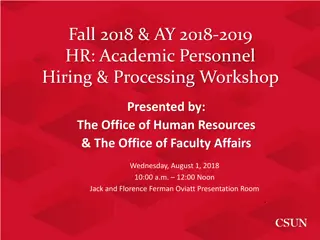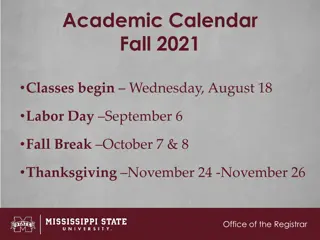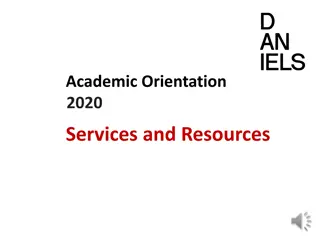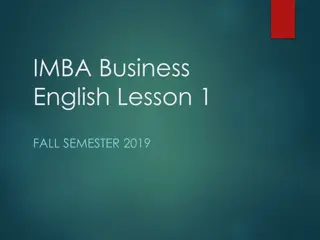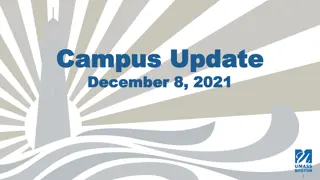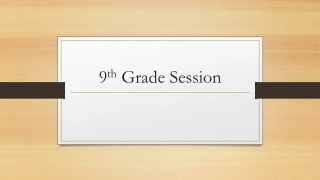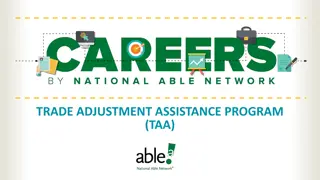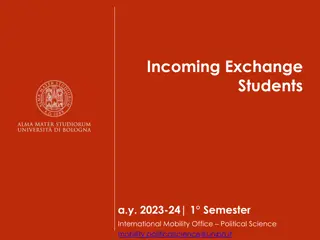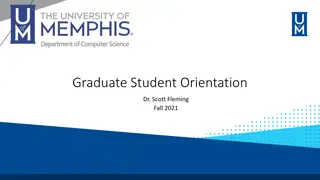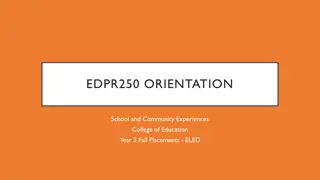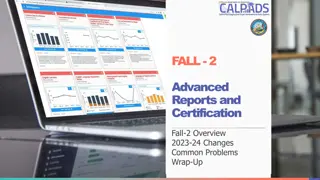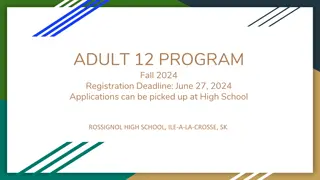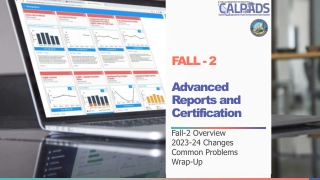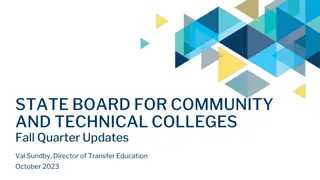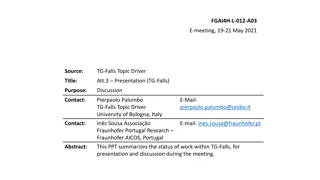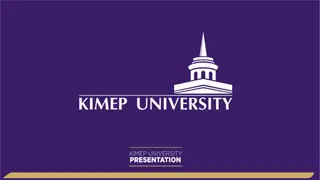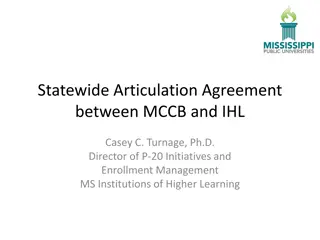Academic and Career Advisement Services Overview for Fall Semester
Providing comprehensive academic and career advisement services for new freshmen, undeclared students, and continuing students. Includes career exploration, academic skill development, tutoring services, new student orientation, and support for declaring/changing majors. Overview of General Education program requirements and components. Emphasis on written English and mathematics competencies.
Download Presentation

Please find below an Image/Link to download the presentation.
The content on the website is provided AS IS for your information and personal use only. It may not be sold, licensed, or shared on other websites without obtaining consent from the author. Download presentation by click this link. If you encounter any issues during the download, it is possible that the publisher has removed the file from their server.
E N D
Presentation Transcript
2021 Fall Semester Academic & Career Advisement Center Jim Gadzinski, Director
Academic Advising Services All New Freshmen Undeclared, Conditionally Admitted & GENS continuing students Career Exploration (Placement is Career Services) Academic Skill Development Academic Proficiency System First Year Experience (FYE) Program for Conditionally Admitted Students (Freshman Probation) All-Campus Tutoring (two locations) Informal Degree Audits Declaring/Changing Majors New Student Orientation Walk-in/Drop-in/On-line Services
Liberal Studies was replaced with General Education in the 2017 Fall Semester Students entering 2017 Fall or beyond complete Gen Ed Students on a bulletin earlier than 2017 Fall remain on Liberal Studies (we will not cover today)
General Education Program Major Other Required Courses Minor General Electives Baccalaureate Associate 30-40 Credits 32-87 Credits 0-48 Credits 16-30 Credits 0-48 Credits 120-150 Credits 60-90 Credits Let s look at each individually
Seven Components (Ten Classes/30-40 Credits) Effective Communication (Two Classes/6-8 Credits) Quantitative Reasoning & Analysis (One Class/3-4 Credits) Social Responsibility in a Diverse World (One Class/3-4 Credits) Integrative Thinking (One Class/3-4 Credits) Human Expression (One Class/3-4 Credits) Perspectives on Society (Two Classes/6-8 Credits) Scientific Inquiry (Two Classes/6-8 Credits) Associate Degrees only require portions of Gen Ed (depending upon type of degree) No limits on credits from any one department Ability to double count between Gen Ed and major or Gen Ed and Minor
Written English Competency Grade of C or better in EN111 and EN211 Mathematics Competency Completed by a grade of C or better in MA101 or higher, if placed into MA111 or higher on placement exam, high ACT or SAT math score, or completing EC140, PSY201 or SO208 2.00 GPA required in all courses to complete General Education World Cultures Course Requirement Laboratory Science Requirement
Individual program requirements differ according to academic department GPA requirements/ C or C- or better rules Upper-division requirements Retake policies (e.g., Math/CS, Education) Departmental approval may be granted for waivers (rare) or substitutions (almost too often) see your Department Head first Students with a double-major are not required to complete a minor (unless the minor is necessary for licensure or certification, e.g., Social Work/Human Behavior cluster minor)
Most frequently used in lieu of a minor Some programs do not list other required, but, in actuality Some have hidden pre-requisites (e.g., requiring one class, but not listing the prerequisite class) Watch out for Gen Ed courses listed as other required (Business 20 credits of Gen Ed work)
A normal minor is usually 20-22 credits Minors of 24 or higher credits are usually teachable minors (secondary ed majors) Minors may not be required in all majors Some minors are required with certain majors (e.g., SW and HB cluster minor) Again, students with a double-major are not required to complete a minor
Not included in Bulletin must do the math! Any course, 100-level or higher, counts for general elective credit, except: Only six credits of COS for BA/BS degree Only three credits of COS for AS degree
General Education Program Major Other Required Courses Minor General Electives Baccalaureate Associate 30-40 Credits 32-87 Credits 0-48 Credits 20-30 Credits 0-48 Credits 120-150 Credits 60-89 Credits
Academic Good Standing Overall NMU GPA of 2.00 or higher Warning Probation (WP) Overall NMU GPA = 1.99 to 1.70 Must sign an AP Agreement May not be academically suspended Academic Probation (AP) Overall NMU GPA = 1.69 to 0.00 Must sign an AP Agreement Must meet specific GPA requirements to remain
Immediate Academic Suspension* New students in 1stsemester at NMU FR and TR At least eight credits and 0.00 GPA first semester Academic Suspension* Students on AP that do not meet specific GPA Suspended for one calendar year, unless an appeal is granted to return earlier Academic Dismissal* Students that return after a suspension and again do not meet required GPA Must wait one calendar year to appeal Appeal must be granted to return *All 15 state universities honor each other s suspensions and dismissals
Overall GPA Credit Hours (at the end of the semester) Less than 28 Credit Hours (Freshmen) 28 to 56 Credit Hours (Sophomores) More than 56 Credit Hours (Juniors and Seniors) Semester GPA Required to Remain at NMU 1.70 Semester GPA 1.80 Semester GPA 2.00 Semester GPA
Forging a relationship with advisees (get them connected ) and provide someone they may go to for help Identifying possible majors and determining the right fit Setting academic and career goals Obtaining resources and assistance Helping students select appropriate courses
A total of 90 credits may be transferred from CC No limit on credits transferred from 4-year colleges and universities Credit is only granted for courses with a C- grade or higher Transfer grades are not computed in the GPA, or used for honors, or proficiency, etc. (but some departments may use for admission to programs, financial aid, etc.) Departmental advanced placement may be an option for students, especially those from non-accredited schools
Orientation Financial (owe money, etc.) Registrar (transcripts, etc.) AP and FP Disciplinary Adviser Hold the only one that you should be able to lift
Unless a hold prohibits doing so Students may drop or add freely up to midnight on the first Thursday of the fall and winter semesters (summer is different) Starting the next morning (Friday, 12:01 a.m.), students must secure a signed add card to add a course, even if it is open After Tuesday of the 2ndweek, and up to Friday of the 10thweek, any course dropped will receive a W grade
ALEKS Math Placement Students take the exam at Orientation Students may retake the exam up to 2 times as long as 5 hours of remediation between exams Students may not enroll in any math course in which they haven t been placed When test is proctored, may count for math competency in addition to placement English Composition Placement For regularly-admitted students, placement is based solely on HSGPA if less than 2.00, must take EN090 or EN109 before EN111 (may appeal) Foreign Language Placement Students should take on-line before they attempt registration in a language course
Designed for students who had a poor first academic performance at NMU, may delete one semester of grades ( W grades) contact ACAC for assistance Must fulfill the following: Cannot have been in ANY school for at least three years before returning to NMU Must complete at least 12 credits (100-level or higher) and earn 2.50 GPA after returning Must be currently enrolled May select one semester of grades May only use the policy once
To receive an I grade, a student must: Wait until the W deadline has passed Be passing the course (cannot award an I for poor or failing performance) Have a legitimate extenuating circumstance (e.g., illness) Not be required to re-take the course as a condition of the incomplete The instructor must complete an Incomplete Grade Form before when issuing an I grade Instructors must designate a deadline to complete the work, not to exceed one year
Almost all freshmen participate in FYE of some sort (certificate/diploma exempt) FYE and Support Program for Conditionally Admitted both under the First Year Programs umbrella All utilize the block concept FYE is for regularly-admitted students Support Program for students admitted conditionally includes UN100B- Freshman Seminar
Q. How many times may a student repeat a course? A. Unless a student fails ( F grade) a course twice in a row, they may repeat a course at any time. Some departments have their own policies (e.g., Math/CS) that differ from NMU s policy. Q. How are repeated grades counted? A. The grade earned the second (or last) time is recorded with the exception of W, MG and I even if the subsequent grade is lower (an F can replace a C- ). Q. What does double-counting mean? A. The term is a bit of a misnomer students may use a course to meet two different requirements, but the course doesn t count twice in terms of credit hours.
Q. Can students double-count a course in their major and minor? A. No. Students may only double-count courses in Gen Ed and their major or Gen Ed and their minor (but not both). Q. When and how do faculty submit grades? A. Grades are submitted by noon on Tuesday following finals week. Grades are entered on-line. MG (missing grade) will be posted if the deadline is missed. Q. How do students receive their grades? A. Students go on-line through MyNMU to see their grades (NMU doesn t mail any grades). Typically, grades are posted by evening on Thursday after Finals Week.
Q. How are students notified when they are placed on Warning or Academic Probation? A. Firstly, they should be aware that less than 2.00 means either WP or AP. The student grade report notes their academic status and the ACAC sends e-mails. Q. How may students on WP or AP sign their agreement form? A. Either in person at the ACAC or on-line at www.nmu.edu/acac. Q. Is there a quick, easy way to calculate or re-calculate GPA? A. Go to www.nmu.edu/acac and click on the GPA calculator.
Q. Who else can lift adviser holds for my advisees? A. Typically, only the assigned adviser should lift the adviser hold. If a student has a secondary adviser, however, they may also lift the hold. Staff in the Registrar s Office and the ACAC staff have the ability to lift holds, but do not do so unless there exists special circumstances. Q. May a student audit a course? A. Yes, a student may enroll in, and pay for, a course to earn a AU grade (doesn t affect GPA or counts as completed coursework).
Q. What are the negative effects of dropping a course to take a W grade? A. The W grade doesn t impact GPA, but an adviser may want to discuss the following with advisees thinking about taking a W : * W grades may be viewed negatively by a prospective employer * The student loses time and money (books, etc.) * Financial aid might be affected. Students must complete 67% of the courses they attempt. At the end of each semester, the FAO checks completion rates and may place the student on warning, and, if they continue to lag behind 67%, they will lose their aid. Q. When do students receive official degree audits? A. Bachelors 87 credit hours; associates 32 credit hours; certificates 16 credit hours
Q. How may a student register for an 080 or 090 course? A. Courses that are less than 100-level do not count for graduation for baccalaureate degrees and most associate degrees. If a student needs or wants to take one, they cannot register for it on MyNMU as is normal procedure. They must go in person to the Student Services Center, the Registrar s Office, or to the ACAC office. Q. Where is the ACAC located? A. The ACAC is located on the top floor of Hedgcock (3302).



